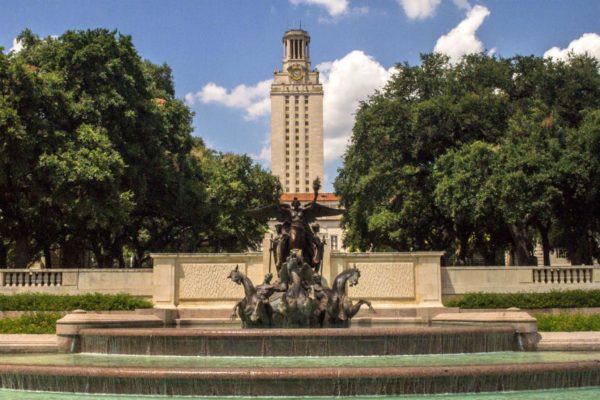It is time to look at things differently. Learning and education usually focus on providing answers, not on the questions themselves. Yet the most significant innovations come from asking questions. The right questions will lead a scholar to knowledge that extends well beyond the frontier of what was previously known. The better the questions, the more extensive the explorations and the more profound the discoveries.
What makes you wonder? Who do you want to become? What questions do you have about art, robots, dinosaurs, chemistry, Shakespeare, or anything else?
This weekend’s Explore UT is the day when The University of Texas at Austin extends an invitation to all Texans to come to campus to discover their own questions. With more than 400 programs and hands-on experiences that showcase all of the amazing research and scholarship happening at the university, there are activities, exhibits, tours and lectures appropriate for visitors of all ages.
Universities such as UT Austin provide the world’s greatest scholars with the perfect environment in which to ask and then explore their best questions. For instance, Adam Heller, a UT Austin engineer, asked why so much blood is needed to check glucose levels in diabetic patients. By the time he and his team had finished exploring all of their related questions, they had created the revolutionary technology that now allows patients to check glucose levels using such small amounts of blood as to be essentially painless.
Andree Bober of UT Austin’s College of Fine Arts asked whether great works of art could be integrated into a major university campus. More than a decade later, there are dozens of magnificent works of inspiring art placed across the Forty Acres.
Livia Eberlin, a UT Austin chemist, asked why surgeons couldn’t completely remove diseased tissue during cancer surgery. After exploring ways to optimize a miniaturized chemical analysis technology, her team recently developed a device the size of a ballpoint pen that can analyze tissue to assist surgeons in removing every trace of a tumor during surgery.
Computer scientist Peter Stone asked whether intelligent robots could learn to play soccer. After years of exploring different programming approaches with his team, his robots won a RoboCup Soccer title, defeating the three-time champions from a university in Germany.
Paleontologist Julia Clarke asked whether dinosaurs were colorful. After exploring the details of countless dinosaur fossils from around the world, she and her team have established that many dinosaurs were covered with brightly colored and patterned feathers, even though they couldn’t fly.
These amazing discoveries and achievements have changed our world. But universities are also built to explore more personal questions that students ask: Who do I want to be? How can I become that person? How much is there to learn? Universities are where students come to ask these and other questions as they broaden their horizons and imagine their futures. The better the individual questions, the better the odds they will be able to realize all of their dreams and ambitions. And that makes such personal questions the most important of all.
The best learning happens when we ask the best questions. The University of Texas at Austin is a world-class university that was specifically built to help Texans explore their most significant questions. Come and explore your questions because you never know what may change the world.
Brent Iverson is the dean of the School of Undergraduate Studies at The University of Texas at Austin and chair of the March 3 event, Explore UT.
A version of this op-ed appeared in the Austin American Statesman.
To view more op-eds from Texas Perspectives, click here.
Like us on Facebook.




